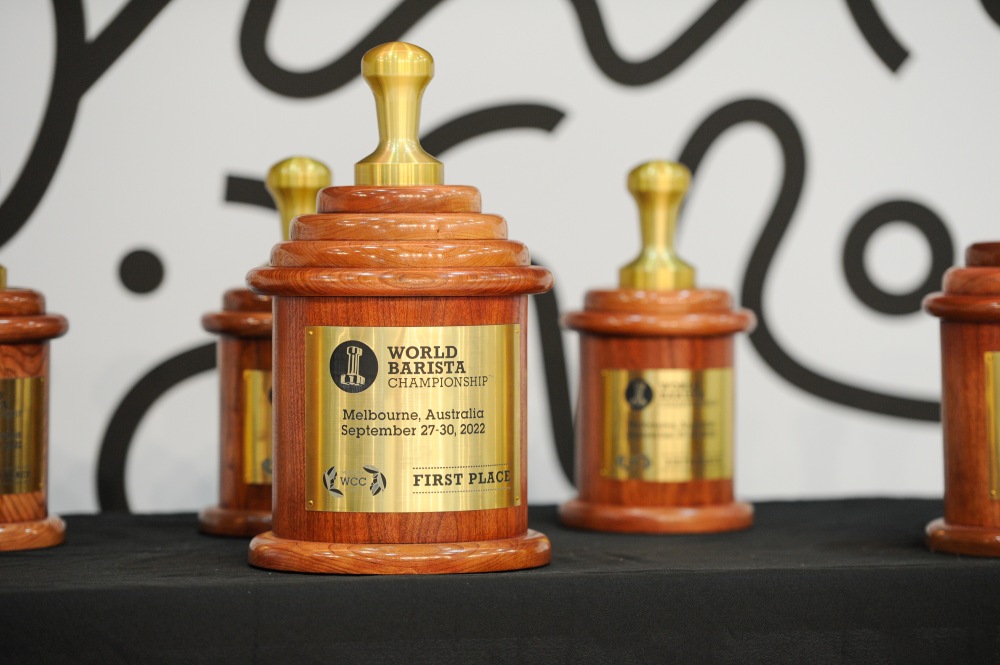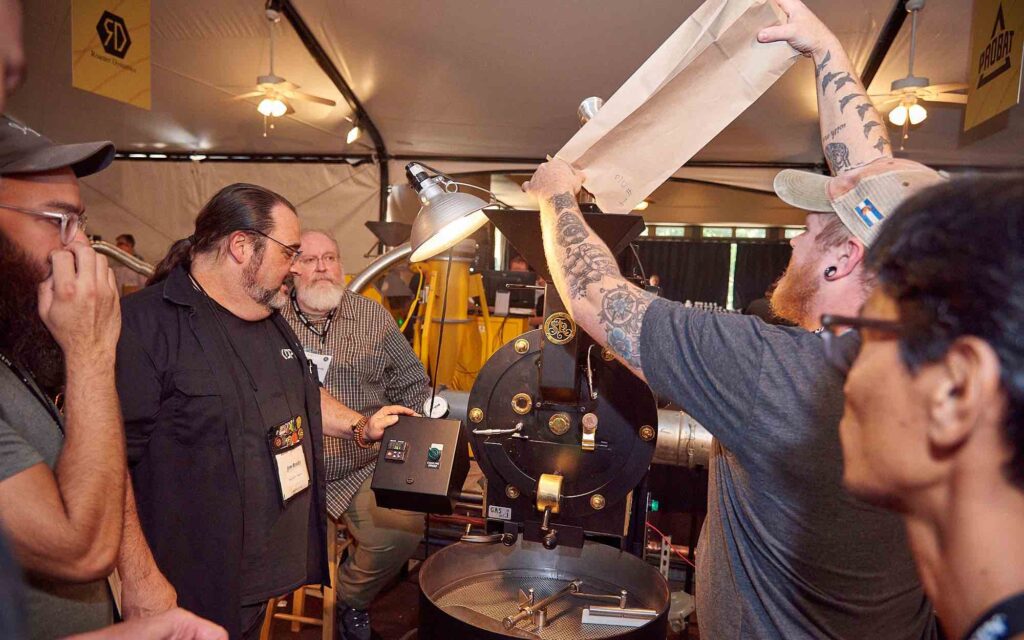National SCA chapters need all the support they can get to operate successfully

The Specialty Coffee Association serves an important role in the coffee sector, bringing together thousands of industry professionals from around the world. The organisation relies heavily on the support and dedication of volunteers, many of whom lead national chapters.
These chapters carry out very necessary and incredibly valuable work, and undoubtedly help to push the industry forward. At the same time, each chapter faces its own unique set of challenges – and needs varying levels of support to overcome them.
To better understand how these issues can be addressed, I spoke to Martin Shabaya, 2021 World Barista Championship finalist, Silvia Constantin of the SCA Romania chapter, and Vinicius Estrela, manager of the Brazilian Specialty Coffee Association.
You may also like our article exploring whether the Barista and Coffee Roasters Guilds benefit the specialty coffee sector.
The history of the SCA
The SCA as we know it today was established in 2017, following the unification of the Specialty Coffee Association of America (founded in 1982) and the Speciality Coffee Association of Europe (established in 1998). By 2016, both associations included some 10,000 members from across the globe – including several volunteer-led chapters in Europe.
Given that there are many different languages, laws, and regulations across Europe, the need for separate chapters across the continent was clear since the early years of the SCAE.
“Once a community of like-minded individuals has come together in a location, there’s an option to explore the founding of a more formal structure: a SCA chapter,” the SCA website reads. “These are communities led by an elected committee of passionate volunteers that represent SCA activities in a specific country or regional territory.
“SCA chapters are responsible for engaging the community in their local region by delivering education, events, research, and other engagement opportunities,” the website continues.
Since the unification of the SCAA and the SCAE, more and more chapters have formed in multiple regions across the globe – and continue to do so.
What does the SCA do?
The SCA says it seeks to unite all industry professionals under one shared goal: improving the specialty coffee sector. It does this in a number of ways:
Organising some of the largest annual events, including several World of Coffee trade shows and the Specialty Coffee Expo, and leading coffee competitions – most notably the World Coffee Championships
Offering internationally-recognised educational programmes such as Authorised SCA trainer courses
Developing ways to assess coffee quality, including the new Coffee Value Assessment
Establishing the Barista, Coffee Roasters, and Coffee Technicians Guilds to provide opportunities for mutual support and knowledge sharing
Additionally, the SCA conducts market research and forms strategic partnerships with other organisations and companies to share knowledge with local communities. Through these efforts, SCA members have access to free resources, programmes, and networking opportunities.
The challenges that SCA chapters face
Despite its increasing international reach, many national SCA chapters still face a variety of challenges which are often the result of geographical location and political, economic, and socio-cultural issues.
In less economically developed countries, access to resources and networking opportunities are often much more limited. This can make it particularly difficult for industry professionals to participate in educational courses and national or international competitions.
Martin Shabaya is a brand ambassador for Sanremo Coffee Machines and the 2021 Kenyan Barista Champion – making him the first African competitor to reach fifth place in the world finals in the competition. He highlights some of the issues that Kenya Coffee Events has experienced over the past few years.
“Securing adequate funding to host various coffee competitions has been the greatest challenge,” he says. “Encouraging people to take part in these competitions is also difficult, especially those from more remote areas or those with limited resources because they have to pay for travel costs and other expenses.
“Although it’s growing, wider awareness and appreciation of specialty coffee is not yet as widespread in Kenya [compared to other countries], so finding sponsors, exhibitors, and partners is a continuous challenge,” he adds.
Setting up chapters
SCA Romania’s National Coordinator, Silvia Constantin, echoes these difficulties.
“In 2008, I formed the chapter and there were 11 of us: ten men and me – the one woman,” she explains. “It took me two years to put it all together. Since then, I’ve been helping to build a specialty coffee community in Romania.”
Silvia also created the Bucharest Coffee Festival and Barista School Romania, using her own money to get them up and running.
“I built everything and paid for competitors’ tickets many times,” she adds. “It was embarrassing to tell them we didn’t have the money, but I wanted to keep their spirit and enthusiasm alive.”
How chapters navigate these issues
National SCA chapters may face similar issues from time to time, but their challenges also vary significantly depending on the geographical location. As just one example, Kenya Coffee Events grapples with high logistical costs, which partly stem from the fact that head judges often come from other countries.
“Perhaps the SCA could offer more flexible educational opportunities to train local and regional head judges,” Martin explains. “This could help cut the high logistical costs of sourcing reps from other countries and use resources to further reduce competitor participation fees.”
Silvia, meanwhile, tells me that significant progress has been made in Romania.
“When I first started organising competitions, we didn’t have much,” she says. “Now, there are training opportunities and workshops prior to each competition, with World Coffee Events reps helping to supervise – it really feels like we’re running an association.
“Networking helps to find good judges, promote more events, and create new competitions – things have definitely improved,” she adds.
Reducing competitors’ costs
Both Martin and Silvia agree that competitors face disproportionately high costs.
According to the World Barista Championship rules, competitors are required to either find sponsors or funders or pay their own expenses. For coffee professionals, particularly those from low-income countries, this can be a huge barrier to entry.
Furthermore, licensed competition bodies must cover travel and accommodation expenses of their respective national champions. In line with this, Silvia points out that sending competitors to high-cost cities such as Chicago, Taipei, and Busan “seems a bit crazy”.
Vinicius Estrela is the Executive Director of the Brazilian Specialty Coffee Association – a partner of the SCA, rather than a chapter. He says the organisation is providing support to competitors following an engagement strategy with both participants and brands.
“We are encouraging new competitors to take part in national competitions and new brands to support Brazilian champions’ journeys to the world finals,” he explains. “We are also looking for new ways to support more supply chain stakeholders so we can deliver the best solutions to the Brazilian coffee community.”
How the SCA’s decisions impact the wider industry
The SCA frequently provides updates on the activities of its national chapters and partners. Although they’re not frequent, they do offer a glimpse into the passion and dedication of members and volunteers across the world.
However, there have been instances when the SCA has made decisions that don’t necessarily reflect the beliefs and values of the wider coffee community.
For example, in 2017, when the SCA announced that it would host four World Coffee Championships in Dubai, this was met with some criticism – particularly from the US coffee community which started a petition to change the location of the event. Signees raised concerns about slave labour and discrimination against the LGBTQ+ community in the UAE.
Fast forward four years and the SCA suspended Russia’s participation in the World Coffee Championships as a result of the government’s invasion of Ukraine.
Representing the views of the wider industry
Silvia expresses her disappointment in both the criticisms and decisions.
“I was one of the people who fought for the WCC to be held in Dubai,” she explains. “It was a great opportunity for the Middle Eastern coffee community. It was a major disappointment when it was cancelled and I also felt the same when the SCA decided to suspend Russia’s participation in competitions last year.
“[We must] make sure the SCA’s decisions are based on a greater understanding of the power of coffee to bring people together,” she elaborates. “I support the actions of promoting coffee in a way that unites us globally – not turning it into a political debate.”
National SCA chapters and partners are essential to the specialty coffee community. Not only do they encourage knowledge sharing, collaboration, and networking, they also encourage connection between different global communities.
Ultimately, however, the SCA must work with its partners in ways which ensure their success and progress.
Enjoyed this? Then read our article questioning whether the World Barista Championship needs to change.
Perfect Daily Grind
Want to read more articles like this? Sign up for our newsletter!
The post National SCA chapters need all the support they can get to operate successfully appeared first on Perfect Daily Grind.




Responses